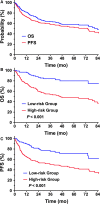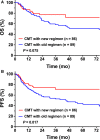Risk-dependent curability of radiotherapy for elderly patients with early-stage extranodal nasal-type NK/T-cell lymphoma: A multicenter study from the China Lymphoma Collaborative Group (CLCG)
- PMID: 30358175
- PMCID: PMC6308086
- DOI: 10.1002/cam4.1849
Risk-dependent curability of radiotherapy for elderly patients with early-stage extranodal nasal-type NK/T-cell lymphoma: A multicenter study from the China Lymphoma Collaborative Group (CLCG)
Abstract
Background: The purpose of this study was to determine the curability of early-stage extranodal nasal-type NK/T-cell lymphoma (NKTCL) in response to radiotherapy and non-anthracycline-based chemotherapy in elderly patients.
Methods: In this multicenter study from the China Lymphoma Collaborative Group (CLCG) database, 321 elderly patients with early-stage NKTCL were retrospectively reviewed. Patients received radiotherapy alone (n = 87), chemotherapy alone (n = 59), or combined modality therapy (CMT, n = 175). Patients were classified into low- or high-risk groups using four prognostic factors. Observed survival in the study cohort vs expected survival in age- and sex-matched individuals from the general Chinese population was plotted using a conditional approach and subsequently compared using a standardized mortality ratio (SMR).
Results: Radiotherapy conveyed a favorable prognosis and significantly improved survival compared to chemotherapy alone. The 5-year overall survival (OS) and progression-free survival (PFS) were 61.2% and 56.4%, respectively, for radiotherapy compared with 44.7% and 38.3%, respectively, for chemotherapy alone (P < 0.001). The combination of a non-anthracycline-based chemotherapy regimen and radiotherapy significantly improved PFS compared to combination of an anthracycline-based chemotherapy regimen and radiotherapy (71.2% vs 44.2%, P = 0.017). Low-risk patients following radiotherapy (SMR, 0.703; P = 0.203) and high-risk patients who achieved PFS at 24 months (SMR, 1.490; P = 0.111) after radiotherapy showed survival equivalent to the general Chinese population.
Conclusions: Our findings indicate a favorable curability for this malignancy in response to radiotherapy and non-anthracycline-based chemotherapy, providing a risk-adapted follow-up and counsel scheme in elderly patients.
Keywords: NK/T-cell lymphoma; elderly; prognosis; radiotherapy; risk stratification.
© 2018 The Authors. Cancer Medicine published by John Wiley & Sons Ltd.
Figures




Similar articles
-
Sequential P-GEMOX and radiotherapy for early-stage extranodal natural killer/T-cell lymphoma: A multicenter study.Am J Hematol. 2021 Nov 1;96(11):1481-1490. doi: 10.1002/ajh.26335. Epub 2021 Sep 13. Am J Hematol. 2021. PMID: 34449095 Free PMC article.
-
Treatment and Prognosis of Newly Diagnosed Advanced-Stage Extranodal Natural Killer/T-Cell Lymphoma: A Single-Center Real-World Study across Two Decades.Chemotherapy. 2024;69(2):108-121. doi: 10.1159/000535128. Epub 2023 Nov 20. Chemotherapy. 2024. PMID: 37984344
-
[Long-term effect of risk-adaptive therapy for early stage extranodal NK/T cell lymphoma].Zhonghua Zhong Liu Za Zhi. 2019 Nov 23;41(11):859-864. doi: 10.3760/cma.j.issn.0253-3766.2019.11.011. Zhonghua Zhong Liu Za Zhi. 2019. PMID: 31770855 Chinese.
-
The significance of combining radiotherapy with chemotherapy for early stage extranodal natural killer/T-cell lymphoma, nasal type: a systematic review and meta-analysis.Leuk Lymphoma. 2014 May;55(5):1038-48. doi: 10.3109/10428194.2013.827789. Epub 2013 Aug 28. Leuk Lymphoma. 2014. PMID: 23885795 Review.
-
The diagnosis and management of NK/T-cell lymphomas.J Hematol Oncol. 2017 Apr 14;10(1):85. doi: 10.1186/s13045-017-0452-9. J Hematol Oncol. 2017. PMID: 28410601 Free PMC article. Review.
Cited by
-
Outcome and risk prediction of early progression in patients with extranodal natural killer/T cell lymphoma from the CLCG study.Ann Hematol. 2023 Sep;102(9):2459-2469. doi: 10.1007/s00277-023-05311-5. Epub 2023 Jun 12. Ann Hematol. 2023. PMID: 37306711 Free PMC article.
-
Optimal Courses of Chemotherapy Combined with Radiotherapy for Low-Risk Extranodal Natural Killer/T-Cell Lymphoma, Nasal Type: A Propensity Score Matching Analysis.Ther Clin Risk Manag. 2020 Dec 2;16:1151-1163. doi: 10.2147/TCRM.S254246. eCollection 2020. Ther Clin Risk Manag. 2020. PMID: 33299317 Free PMC article.
-
Validation of nomogram-revised risk index and comparison with other models for extranodal nasal-type NK/T-cell lymphoma in the modern chemotherapy era: indication for prognostication and clinical decision-making.Leukemia. 2021 Jan;35(1):130-142. doi: 10.1038/s41375-020-0791-3. Epub 2020 Mar 9. Leukemia. 2021. PMID: 32152465 Free PMC article.
-
Treatment of localized extranodal NK/T cell lymphoma, nasal type: a systematic review.J Hematol Oncol. 2018 Dec 20;11(1):140. doi: 10.1186/s13045-018-0687-0. J Hematol Oncol. 2018. PMID: 30567593 Free PMC article.
-
Evidence of cure for extranodal nasal-type natural killer/T-cell lymphoma with current treatment: an analysis of the CLCG database.Haematologica. 2023 Sep 1;108(9):2467-2475. doi: 10.3324/haematol.2022.281847. Haematologica. 2023. PMID: 36951150 Free PMC article.
References
-
- Sun J, Yang Q, Lu Z, et al. Distribution of lymphoid neoplasms in China: analysis of 4,638 cases according to the World Health Organization classification. Am J Clin Pathol. 2012;138:429‐434. - PubMed
-
- Aoki R, Karube K, Sugita Y, et al. Distribution of malignant lymphoma in Japan: analysis of 2260 cases, 2001–2006. Pathol Int. 2008;58:174‐182. - PubMed
-
- Vose J, Armitage J, Weisenburger D. International peripheral T‐cell and natural killer/T‐cell lymphoma study: pathology findings and clinical outcomes. J Clin Oncol. 2008;26:4124‐4130. - PubMed
-
- Kim TM, Lee SY, Jeon YK, et al. Clinical heterogeneity of extranodal NK/T‐cell lymphoma, nasal type: a national survey of the Korean Cancer Study Group. Ann Oncol. 2008;19:1477‐1484. - PubMed
-
- Yang Y, Zhang YJ, Zhu Y, et al. Prognostic nomogram for overall survival in previously untreated patients with extranodal NK/T‐cell lymphoma, nasal‐type: a multicenter study. Leukemia. 2015;29:1571‐1577. - PubMed
Publication types
MeSH terms
Substances
LinkOut - more resources
Full Text Sources

